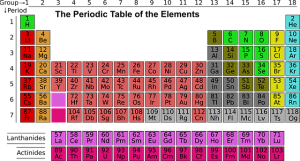Selenium is an essential trace element for good health. If we are to survive and reproduce, we need some selenium in our diets. Not much but some. The reason is that our bodies cannot synthesize the selenium we need. Many of us live in a region of the world with low selenium content in the soil and in the regionally grown food products. Accordingly, it is difficult for us to get enough selenium in our diet.

For example, Alexander et al point out that mainland Europe and Scandinavia are regions with a low intake of selenium. North America, by contrast, is a region with much higher selenium intake. There is considerable variation in the selenium content of locally cultivated food products around the world. Consequently, daily selenium intake varies considerably. Depending upon the region we live in, we may be at risk of sub-optimal selenium intakes or selenium deficiency [Alexander 2024].
Risks Associated with Low Selenium Intakes
In the regions with low selenium intake, inhabitants may be at greater risk of impaired immune function [Alexander 2023]:
- less protection against oxidative stress
- higher risk of systemic inflammation
- higher risk of thyroid dysfunction
- higher risk of kidney disorders
- higher risk of cardiovascular disease
- higher risk of male infertility
Mortality Risk Associated with Low Selenium Intakes
In an analysis of observational studies, Cui et al have shown that low selenium intakes are significantly associated with increased risk of dying earlier in life [Cui 2025]:
- low selenium intake associated with higher all-cause mortality
- low selenium intake associated with higher cancer mortality
- low selenium intake associated with higher cardiovascular disease mortality
Positive Health Benefits of Selenium Supplementation
In a cohort of elderly Swedish citizens low in selenium (median serum selenium level: 67.1 mcg/L), low selenium status was associated with an increased risk of cardiovascular mortality [Alehagen 2022]. Moreover, in the randomized controlled KiSel-10 trial, the researchers observed numerous positive health effects of selenium supplementation in the elderly individuals with low selenium intakes.

Compared with placebo, combined daily supplementation with 200 mcg of selenium and 200 mg of Coenzyme Q10 for four years had the following statistically significant positive effects:
- reduced the risk of cardiovascular mortality and improved heart function and quality of life [Alehagen 2022]
- reduced the level of circulating biomarkers of oxidative stress, systemic inflammation, and tissue fibrosis [Alehagen 2022]
- had a beneficial effect on thyroid hormones [Alehagen 2024]
- improved kidney function [Alehagen 2020 Dec]
- preserved leukocyte telomere length [Opstad 2022]
- increased circulating levels of SIRT1 [Opstad 2024]
- reduced plasma levels of the von Willebrand factor and the plasminogen activator inhibitor-1, both bio-markers for endothelial dysfunction [Alehagen 2020]
Sex Differences in Health Benefits of Selenium Supplementation
It is interesting to note that the combined supplementation reduced the risk of cardiovascular mortality to a significantly greater extent in females than in males [Alehagen 2025 Jun].
Conclusion: Selenium and Health Benefits
Dietary intakes of selenium vary considerably from one region of the world to another.
Intakes of selenium are relatively low in many parts of Europe and Scandinavia.
Low selenium intake is associated with increased morbidity and mortality.
Selenium supplementation in elderly individuals low in selenium is associated with improved heart function, improved kidney function, and improved thyroid gland function.
Sources
Alehagen U et al. Significant decrease of von Willebrand factor and plasminogen activator inhibitor-1 by providing supplementation with selenium and Coenzyme Q10 to an elderly population. European Journal of Nutrition. 2020;59:3581-3590.
Alehagen U et al. Selenium and Coenzyme Q10 supplementation improves renal function in elderly deficient in selenium: observational results and results from a subgroup analysis of a prospective randomized double-blind placebo-controlled trial. Nutrients. 2020 Dec 9;12(12):3780.
Alehagen U et al. Improved cardiovascular health by supplementation with selenium and coenzyme Q10: applying structural equation modelling to clinical outcomes and biomarkers to explore underlying mechanisms in a prospective randomized double-blind placebo-controlled intervention project in Sweden. Eur J Nutr. 2022 Sep;61(6):3135-3148.
Alehagen U et al. Supplementation with selenium and coenzyme Q10 in an elderly Swedish population low in selenium – positive effects on thyroid hormones, cardiovascular mortality, and quality of life. BMC Med. 2024 May 7;22(1):191.
Alehagen U et al. Selenium and Coenzyme Q10 supplementation and sex differences in cardiovascular mortality results from a prospective randomized double-blind placebo-controlled trial in elderly people low in selenium. Antioxidants (Basel). 2025 Jun 5;14(6):685.
Alexander J, Olsen AK. Selenium – a scoping review for Nordic Nutrition Recommendations 2023. Food Nutr Res. 2023 Dec 28;67.
Alexander J. Circulating glutathione peroxidase-3 in elderly—association with renal function, cardiovascular mortality, and impact of selenium and Coenzyme q10 supplementation. Antioxidants. 2024;13:1566.
Opstad TB et al. Selenium and Coenzyme Q10 intervention prevents telomere attrition, with association to reduced cardiovascular mortality-sub-study of a randomized clinical trial. Nutrients. 2022 Aug 15;14(16):3346.
Opstad TB et al. Increased SIRT1 concentration following four years of selenium and Q10 intervention associated with reduced cardiovascular mortality at 10-year follow-up-sub-study of a previous prospective double-blind placebo-controlled randomized clinical trial. Antioxidants (Basel). 2023 Mar 21;12(3):759.
The information presented in this review article is not intended as medical advice. It should not be used as such.
